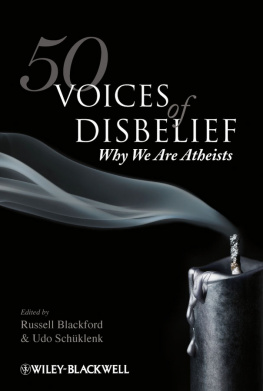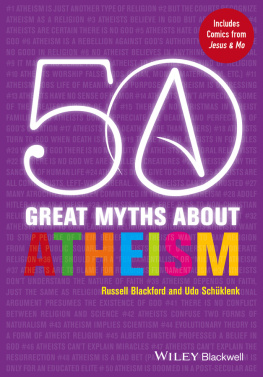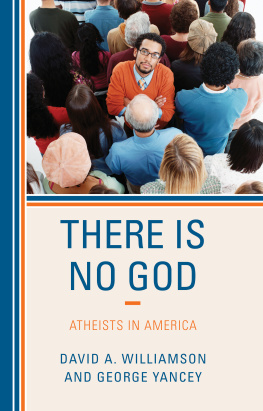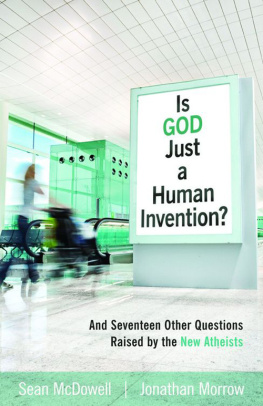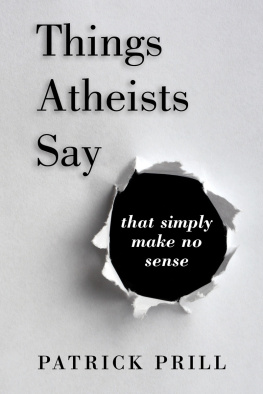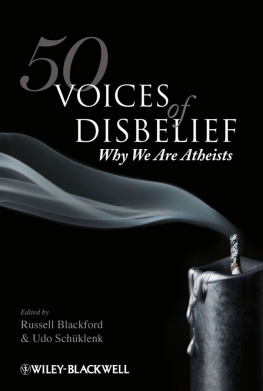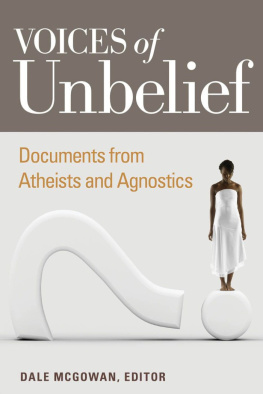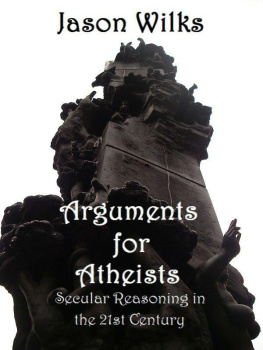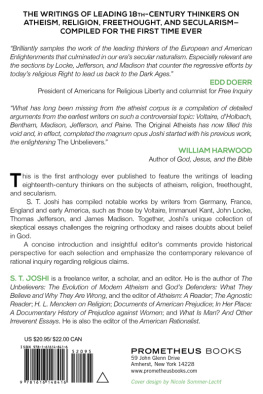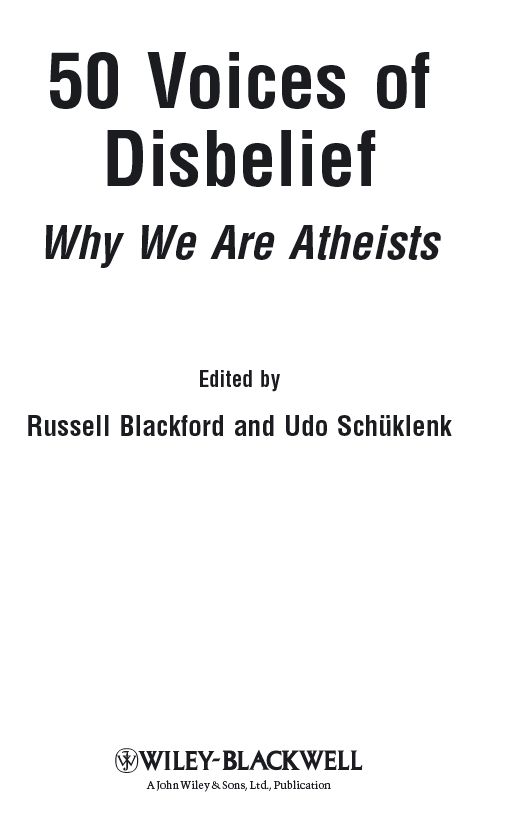
2009 Blackwell Publishing Ltd
Blackwell Publishing was acquired by John Wiley & Sons in February 2007.
Blackwells publishing program has been merged with Wileys global Scientific, Technical, and Medical business to form Wiley-Blackwell.
Registered Office
John Wiley & Sons Ltd, The Atrium, Southern Gate, Chichester, West Sussex, PO19 8SQ, United Kingdom
Editorial Offices
350 Main Street, Malden, MA 02148-5020, USA
9600 Garsington Road, Oxford, OX4 2DQ, UK
The Atrium, Southern Gate, Chichester, West Sussex, PO19 8SQ, UK
For details of our global editorial offices, for customer services, and for information about how to apply for permission to reuse the copyright material in this book please see our website at www.wiley.com/wiley-blackwell.
The right of Russell Blackford and Udo Schklenk to be identified as the author of the editorial material in this work has been asserted in accordance with the Copyright, Designs and Patents Act 1988.
All rights reserved. No part of this publication may be reproduced, stored in a retrieval system, or transmitted, in any form or by any means, electronic, mechanical, photocopying, recording or otherwise, except as permitted by the UK Copyright, Designs and Patents Act 1988, without the prior permission of the publisher.
Wiley also publishes its books in a variety of electronic formats. Some content that appears in print may not be available in electronic books.
Designations used by companies to distinguish their products are often claimed as trademarks. All brand names and product names used in this book are trade names, service marks, trademarks or registered trademarks of their respective owners. The publisher is not associated with any product or vendor mentioned in this book. This publication is designed to provide accurate and authoritative information in regard to the subject matter covered. It is sold on the understanding that the publisher is not engaged in rendering professional services. If professional advice or other expert assistance is required, the services of a competent professional should be sought.
Internal illustration Emily2k/Istockphoto.
Library of Congress Cataloging-in-Publication Data
50 voices of disbelief: why we are atheists/edited by Russell Blackford and Udo Schklenk.
p. cm.
Includes bibliographical references and index.
ISBN 978-1-4051-9045-9 (hardcover: alk. paper) ISBN 978-1-4051-9046-6 (pbk.: alk. paper)
1. Atheists. 2. Atheism. I. Blackford, Russell, 1954 II. Schklenk, Udo.
III. Title: 50 voices of disbelief.
BL2785.A13 2009
211.8dc22
2009007108
Acknowledgments
The editors would like to thank the following people for their assistance and support:
Meryem Benkirane, Jenny Blackford, Stephanie Tran, and the staff of Wiley-Blackwell, who made the project possible and responded kindly and efficiently to the needs of two editors in far-flung places.
Introduction: Now More Important than Ever Voices of Reason
Russell Blackford and Udo Schklenk
Why did we come together to edit a volume of humanist thought? Why did we ask some 50 scientists, philosophers, science fiction writers, political activists, and public intellectuals from across the globe to put down in writing the reasons that convinced them personally that there is not an all-powerful, all-knowing, good and loving God watching over us?
The answer to this is surprisingly simple: we think it is important for Voices of Reason to be heard at this point in our history. Religious fanaticism seems to have become ever more successful in preventing even multicultural societies from discussing the merits, or otherwise, of religious ideologies versus humanist alternatives. Cartoonists and authors of books critical of religion have become popular targets for death threats by religious fanatics. Each week, it seems harder to keep the candle of reason alight. Yet, respect for the intolerant ideologues teachings has, it seems, become the order of the day, when intolerance of intolerance would arguably be a more appropriate response to religious fundamentalism (German speakers might compare the views of Henryk Broder). As philosopher Laura Purdy, and other contributors to this volume, argue, it is important to speak out when religious ideologies and their lobbyists encroach on our individual freedoms.
As we write, concerted attempts are being made at the level of the United Nations to cement a new concept into international law, the dangerous idea of defamation of religion. If successful, these efforts would make it even more difficult to criticize religious dogma, religion-based repression of individual rights, or the many cruel practices that are shielded, from time to time, by invocations of religion and culture. Defamation law exists to protect individuals from slurs that might destroy lives or careers, not to protect systems of belief or prevent the exposure of evils done in their name. Religious dogmas and organizations are legitimate targets for fearless criticism or satire.
It is worthwhile stating the painfully obvious: namely, the emperor really is naked. The political influence enjoyed by the worlds religions notwithstanding, we have no good reason to believe that God exists, and we should not accept the action-guiding maxims of religious ideologies on the authority of someone as elusive as God. Like other ideologies, religious teachings and policy stances must be subjected to searching critical analysis. Competition in the marketplace of ideas must be fair; there must not be special treatment for religious ideas of any kind.
It was to be expected, given human nature, that there would be a backlash against the God Delusion, as Richard Dawkins described it so aptly. Authors such as Dawkins, Christopher Hitchens, Sam Harris, Austin Dacey, Daniel Dennett, and others have published influential and often bestselling books (see the references below) in which they have outlined why we should not believe in God, and indeed why such beliefs, all other things being equal, are likely to produce more harm than good. They follow in the honorable tradition of Bertrand Russell and others, dating far back to the Carvakas and Epicureans of Eastern and Western antiquity, critical of religion and its claimed authority over our lives. We see this book as a contribution to a long and admirable humanist tradition.
Most people have given serious thought to the possibility that God exists. Some of the deals that God seems to offer do appear enticing perhaps too enticing. Who of sound mind would really say no to eternal life? Who would not mind trading earthly problems for eternal life in paradise? Atheists do. We reject the deal on the table not because we believe that eternal life would necessarily be a bad thing; no, we do so because we know that the deal is not as good as it looks. We refuse to overlook the inconvenient fact that there is no evidence of eternal life.
It seemed worth asking thoughtful people, like the contributors to this book: Why is it that you are an atheist today? What is it that convinced you that there is no loving, all-powerful, all-knowing God who has created the universe and still spends his time watching over us, his less than perfect creation? In response to our challenge, we received an amazing collection of original, often very personal answers. Unsurprisingly, these answers find common ground on some issues and are in conflict on others.

